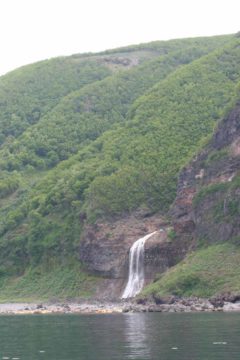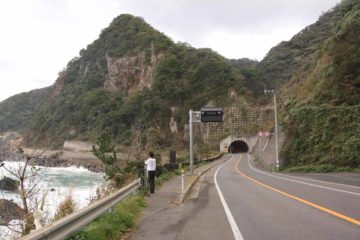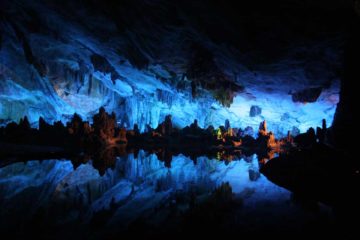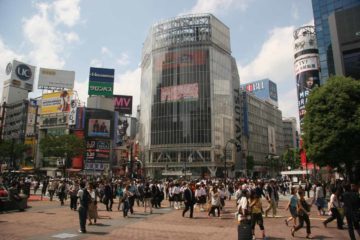About Kamuiwakka Waterfall (Kamuiwakka-no-taki [カムイワッカの滝])
The Kamuiwakka Waterfall (Kamuiwakka-no-taki [カムイワッカの滝]; Kamuiwakka Falls) was a pretty well-known rotemburo (hot springs waterfall) deep in the wild Shiretoko National Park. The fact that it was a thermal springs-fed waterfall made it stand out from the rest of the waterfalls we had seen in Japan so far. Unfortunately for us, we couldn’t experience the onsen aspect of this rotemburo as the only way we were able to experience this waterfall was by boat. Had we been able to do this waterfall both ways, we would’ve bumped up the rating score of this waterfall for sure.
From our trip research, we could have been able to visit on of this waterfall’s upper tiers where there was a geothermally heated plunge pool that would’ve allowed us to soak in its sulphur-rich hot water right beneath the falls itself. Unfortunately, we weren’t able to exercise this option because we needed to take the unsealed road through bear country on a shuttle bus that ran only from July 15 to August 15! We weren’t sure if this very restrictive access was to protect the bears or for maintenance and remodeling or all of these. In any case, we were here a month too early so we had to find another way to see the falls.

In any case, the boat tour took us along the western coast of the Shiretoko-hanto (Shiretoko Peninsula) up towards the peninsula’s tip where there was a lighthouse that we witnessed from a distance. This tour featured wildlife sightings, including eagles and bears as well as small sea arches, and many other waterfalls.
In fact, since this was the only way we experienced the Kamuiwakka Waterfall our June 2009 visit, we could’ve lumped this in together with the many other Shiretoko Waterfalls we’re featuring on a separate page. However, we left this waterfall on its own page because of its unique geothermal characteristics, how it stood out against those other Shiretoko Waterfalls on its own, and how it was possible to easily access it by land had it been open.
During the boat ride, something that really caught our eye about the Kamuiwakka Waterfall was the evidence of sulphur in its waters. From the boat, we could clearly see yellow-stained rocks lining the outflow of the falls, which was strong evidence of the presence of sulphur in the stream. Moreover, we could see how the light green waters coming from the Kamuiwakka Stream mixed with the darker green waters of the Sea of Okhotsk, which was an interesting juxtaposition of mineral-rich freshwater and salt water. And if the visual evidence wasn’t enough, the strong sulphur smell around the falls also dominated over the sea spray smell that we would otherwise be used to whenever we were near an ocean or sea.
Finally, we’re not sure what the word “kamuiwakka” means, but we do know it’s Ainu (the indigenous peoples of Hokkaido and surrounding islands as well as Northern Honshu). We say this because of the many Japanese sound characters in its kanji name spelled out, which hinted to us that the word was not Japanese to begin with.
Related Top 10 Lists
No Posts Found
Trip Planning Resources
Nearby Accommodations
This content is for members only. See Membership Options.Featured Images and Nearby Attractions
This content is for members only. See Membership Options.Visitor Comments:
Got something you'd like to share or say to keep the conversation going? Feel free to leave a comment below...No users have replied to the content on this page
Visitor Reviews of this Waterfall:
If you have a waterfall story or write-up that you'd like to share, feel free to click the button below and fill out the form...No users have submitted a write-up/review of this waterfall






Only logged in users can post a comment Please login or sign up to comment